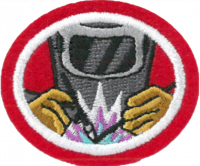Difference between revisions of "AY Honors/Welding/Answer Key 2/en"
From Pathfinder Wiki
(Updating to match new version of source page) |
(Updating to match new version of source page) |
||
| Line 265: | Line 265: | ||
==References== | ==References== | ||
| − | [[Category: | + | <div lang="en" dir="ltr" class="mw-content-ltr"> |
| − | + | <noinclude> | |
| − | + | </div></noinclude> | |
| + | |||
| + | [[Category:Instructor Required{{GetLangSuffix}}|{{SUBPAGENAME}}]] | ||
{{CloseHonorPage}} | {{CloseHonorPage}} | ||
Latest revision as of 21:36, 5 October 2021
Qualified welding instructor required.
The Welding Honor is perhaps of all the AY honors, the one with the greatest potential to cause injury. If done wrong you can also create unsafe equipment (see requirement note at end) Do not attempt to teach yourself how to weld. An experienced instructor is absolutely required for this honor.
1
Successfully complete a minimum of three hours of classroom instruction.*
2
Identify the following:
2a
Welding hood
2b
GMAW welding wire
2c
SMAW power supply
2d
Welding gas regulator
2e
GMAW welding torch
2f
220-volt electrical outlet
2g
PAC torch
3
Explain the following terms:
3a
Fusion welding
3b
Electrode
3c
Oxidation
3d
Slag
3e
Alloy
4
Select and describe one fusion welding process.
4a
How is heat generated?
4b
Why is filler metal added?
4c
Describe how the molten metal is protected from oxidation.
5
Name at least one thermal and one mechanical cutting process.
5a
Describe how each one works.
5b
Discuss relative advantages and limitations of each.
6
Demonstrate a knowledge of risks and hazards associated with welding and cutting, and the steps to prevent or reduce them.
6a
Electric current
6b
High temperatures
6c
Ultraviolet radiation
6d
Toxic fumes
6e
Moving machinery/blades
6f
High-pressure gases
7
Describe the safety gear required for various fusion welding and cutting processes.
7a
Head/eye protection
7b
Clothing
7c
Gloves
7d
Hearing
7e
Filtration/ventilation
8
For either the GMAW or SMAW welding process, demonstrate an ability to use welding guidelines, such as handbook tables, to select the appropriate welding process parameter settings, including proper amperage and electrode type/size for various types and thicknesses of a selected metal.
9
Explain and demonstrate proper equipment setup and consumables selection for at least one welding process.
10
Describe all the components of the equipment to be used and their function.
11
Using the designated processes, perform the following:
11a
PAC: Make one straight cut at least three inches long in mild steel or aluminum
11b
SMAW: Complete i and ii, or complete iii.
i
Make two bead-on-plate welds at least two inches total length
ii
Make one square-groove weld in the flat position
iii
Make one corner weld in the flat position
11c
GMAW: Complete i and ii, or complete iii.
i
Make two bead-on-plate welds at least two inches total length
ii
Make one square-groove weld in the flat position
iii
Make one lap weld in the flat position
Note
* Must pass a knowledge exam upon completion.
^ These are minimum requirements; additional welding is encouraged
^ These are minimum requirements; additional welding is encouraged


